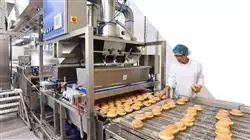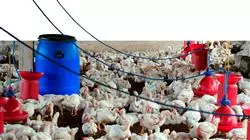University certificate
The world's largest faculty of nutrition”
Introduction to the Program
It appropriates the concepts related to the HACCP System and applies its benefits in order to improve risk analysis and have greater control over food production processes"

This program in HACCP System Implementation is a unique opportunity for students to acquire specialized knowledge in the field of food production and processing, as well as the particularities that each type of food has at the time of its handling. With this in mind, participants will explore the technical fundamentals of conducting a good Hazard Analysis within the food production chain in order to ensure food safety and quality.
This will be possible thanks to the complete syllabus of the program, which will provide the definition of the concepts related to the composition of each kind of food of vegetable and animal origin, with the objective of recognizing the risks to which they can be subjected and the application of the appropriate technique to mitigate them. In addition, food safety will be studied in depth, which will be based on the recognition of the critical points of the production chain, as these will allow the student to integrate the appropriate strategies to prevent accidents or bad handling practices.
This program is offered through the innovative Relearning methodology, which allows 100% online study, giving students the flexibility to learn from anywhere and at any time that suits them. In addition, they will have access to multimedia resources 24 hours a day, allowing them to assimilate the content at their own pace. In addition, through the analysis of practical cases, participants will develop problem-solving skills by facing simulated situations in a realistic environment.
A program designed for those professionals who are looking to achieve success within the Food Industry”
This Postgraduate certificate in HACCP System Implementation contains the most complete and up-to-date scientific program on the market. The most important features include:
- The development of case studies presented by experts in HACCP System Implementation
- The graphic, schematic, and practical contents with which they are created, provide scientific and practical information on the disciplines that are essential for professional practice
- Practical exercises where self-assessment can be used to improve learning
- Its special emphasis on innovative methodologies
- Theoretical lessons, questions to the expert, debate forums on controversial topics, and individual reflection assignments
- Content that is accessible from any fixed or portable device with an Internet connection
Once you complete this program, you will be able to open up new job opportunities and increase your economic expectations"
The program’s teaching staff includes professionals from the sector who contribute their work experience to this educational program, as well as renowned specialists from leading societies and prestigious universities.
Its multimedia content, developed with the latest educational technology, will provide the professional with situated and contextual learning, i.e., a simulated environment that will provide an immersive education programmed to learn in real situations.
The design of this program focuses on Problem-Based Learning, by means of which the professional must try to solve the different professional practice situations that are presented throughout the academic course. For this purpose, the student will be assisted by an innovative interactive video system created by renowned experts.
Learning at your own pace is a reality thanks to the methodology of this program. Start now and be part of the professionals of the future"

Ensure your professional success by enrolling in this Postgraduate certificate and stand out in the Food Industry"
Why study at TECH?
TECH is the world’s largest online university. With an impressive catalog of more than 14,000 university programs available in 11 languages, it is positioned as a leader in employability, with a 99% job placement rate. In addition, it relies on an enormous faculty of more than 6,000 professors of the highest international renown.

Study at the world's largest online university and guarantee your professional success. The future starts at TECH”
The world’s best online university according to FORBES
The prestigious Forbes magazine, specialized in business and finance, has highlighted TECH as “the world's best online university” This is what they have recently stated in an article in their digital edition in which they echo the success story of this institution, “thanks to the academic offer it provides, the selection of its teaching staff, and an innovative learning method aimed at educating the professionals of the future”
A revolutionary study method, a cutting-edge faculty and a practical focus: the key to TECH's success.
The most complete study plans on the university scene
TECH offers the most complete study plans on the university scene, with syllabuses that cover fundamental concepts and, at the same time, the main scientific advances in their specific scientific areas. In addition, these programs are continuously being updated to guarantee students the academic vanguard and the most in-demand professional skills. In this way, the university's qualifications provide its graduates with a significant advantage to propel their careers to success.
TECH offers the most comprehensive and intensive study plans on the current university scene.
A world-class teaching staff
TECH's teaching staff is made up of more than 6,000 professors with the highest international recognition. Professors, researchers and top executives of multinational companies, including Isaiah Covington, performance coach of the Boston Celtics; Magda Romanska, principal investigator at Harvard MetaLAB; Ignacio Wistumba, chairman of the department of translational molecular pathology at MD Anderson Cancer Center; and D.W. Pine, creative director of TIME magazine, among others.
Internationally renowned experts, specialized in different branches of Health, Technology, Communication and Business, form part of the TECH faculty.
A unique learning method
TECH is the first university to use Relearning in all its programs. It is the best online learning methodology, accredited with international teaching quality certifications, provided by prestigious educational agencies. In addition, this disruptive educational model is complemented with the “Case Method”, thereby setting up a unique online teaching strategy. Innovative teaching resources are also implemented, including detailed videos, infographics and interactive summaries.
TECH combines Relearning and the Case Method in all its university programs to guarantee excellent theoretical and practical learning, studying whenever and wherever you want.
The world's largest online university
TECH is the world’s largest online university. We are the largest educational institution, with the best and widest online educational catalog, one hundred percent online and covering the vast majority of areas of knowledge. We offer a large selection of our own degrees and accredited online undergraduate and postgraduate degrees. In total, more than 14,000 university degrees, in eleven different languages, make us the largest educational largest in the world.
TECH has the world's most extensive catalog of academic and official programs, available in more than 11 languages.
Google Premier Partner
The American technology giant has awarded TECH the Google Google Premier Partner badge. This award, which is only available to 3% of the world's companies, highlights the efficient, flexible and tailored experience that this university provides to students. The recognition as a Google Premier Partner not only accredits the maximum rigor, performance and investment in TECH's digital infrastructures, but also places this university as one of the world's leading technology companies.
Google has positioned TECH in the top 3% of the world's most important technology companies by awarding it its Google Premier Partner badge.
The official online university of the NBA
TECH is the official online university of the NBA. Thanks to our agreement with the biggest league in basketball, we offer our students exclusive university programs, as well as a wide variety of educational resources focused on the business of the league and other areas of the sports industry. Each program is made up of a uniquely designed syllabus and features exceptional guest hosts: professionals with a distinguished sports background who will offer their expertise on the most relevant topics.
TECH has been selected by the NBA, the world's top basketball league, as its official online university.
The top-rated university by its students
Students have positioned TECH as the world's top-rated university on the main review websites, with a highest rating of 4.9 out of 5, obtained from more than 1,000 reviews. These results consolidate TECH as the benchmark university institution at an international level, reflecting the excellence and positive impact of its educational model.” reflecting the excellence and positive impact of its educational model.”
TECH is the world’s top-rated university by its students.
Leaders in employability
TECH has managed to become the leading university in employability. 99% of its students obtain jobs in the academic field they have studied, within one year of completing any of the university's programs. A similar number achieve immediate career enhancement. All this thanks to a study methodology that bases its effectiveness on the acquisition of practical skills, which are absolutely necessary for professional development.
99% of TECH graduates find a job within a year of completing their studies.
Postgraduate Certificate in HACCP System Implementation
During the Postgraduate certificate, you will learn about the basic principles of A.P.P.C.C. and how to apply them in different business contexts. You will also learn the tools and techniques needed to assess risks, define critical control points and develop action plans to ensure the safety and quality of the products and services offered by the company. In addition, the program includes case studies and real examples so that you can apply the knowledge acquired effectively.
Ensure quality in business processes with the Postgraduate certificate in A.P.P.C.C.C
If you are looking for a way to improve the quality of business processes, the Postgraduate certificate in A.P.P.C.C. system implementation is the ideal solution. With this program, you will be able to acquire the necessary skills to implement A.P.P.C.C. systems in any organization and improve the safety and quality of the products and services offered.
During the course, you will learn about the basic principles and tools of A.P.P.P.C.C., as well as its application in different business contexts. You will also learn about risk assessment techniques, identification of critical control points and definition of action plans to ensure the safety and quality of products and services. In addition, the program includes case studies and real examples so that you can apply the knowledge acquired in real business situations. With the Postgraduate certificate in A.P.P.C.C., you will be able to improve the quality of business processes and guarantee customer satisfaction.







